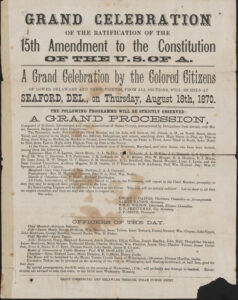
“Grand Celebration of the Ratification of the 15th Amendment to the Constitution of the U.S. of A.” MSS 0461, Torbert-Ellegood collection, Special Collections, University of Delaware Library, Newark, Delaware.
On February 3, 1870, the 15th Amendment to the Constitution was ratified, declaring: “The right of citizens of the United States to vote shall not be denied or abridged by the United States or by any State on account of race, color, or previous condition of servitude.” Significantly, this meant that Black citizens could not be denied the right to vote.
Digital Collections and Preservation recently scanned MSS 0461, the Torbert-Ellegood collection; now available in UDSpace. One of the items digitized was a broadside announcement described in the finding aid as “a celebration of the passage of the fifteenth amendment” on August 18, 1870. The broadside itself indicates that the celebration was organized by the “Colored citizens of lower Delaware” and would include a procession to be held through the streets of Seaford as well as speeches by prominent citizens of Delaware, Maryland, and nearby states. Delaware initially opposed the 15th Amendment, as well as the 13th Amendment, which ended slavery, and the 14th Amendment, which granted citizenship to the formerly enslaved. All three Amendments were not ratified by the state until February 12, 1901.
This broadside sheds light on Delaware’s long and complicated history of slavery, particularly in Sussex County where Seaford is located. U.S. Census records indicate that Delaware’s enslaved population was 1798 individuals in 1860, with 1341 of those enslaved people held in Sussex County. Meanwhile, from 1860 to 1870, Sussex County’s free Black population increased from 4370 to 5438.
Even with the passing of the 15th Amendment, Black women had to continue advocating for their own right to vote. University of Delaware professor emerita Anne Boylan estimated that 20 percent of the suffrage leaders in Delaware were Black. The writer, activist, and educator Alice Dunbar-Nelson was part of the Equal Suffrage Study Club, founded by Black women. Many of Dunbar-Nelson’s papers, including her diary of suffrage activities, can also be viewed in UDSpace.
Related readings:
